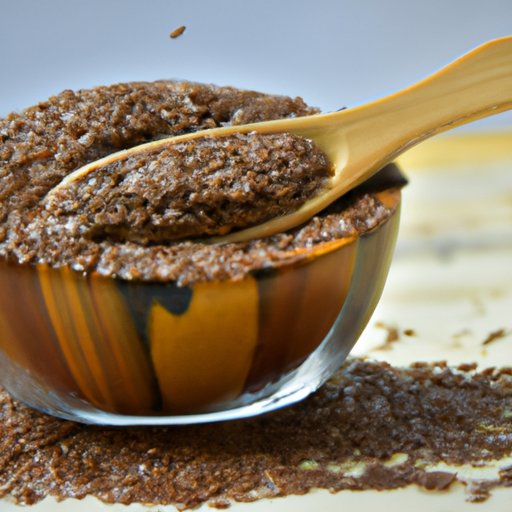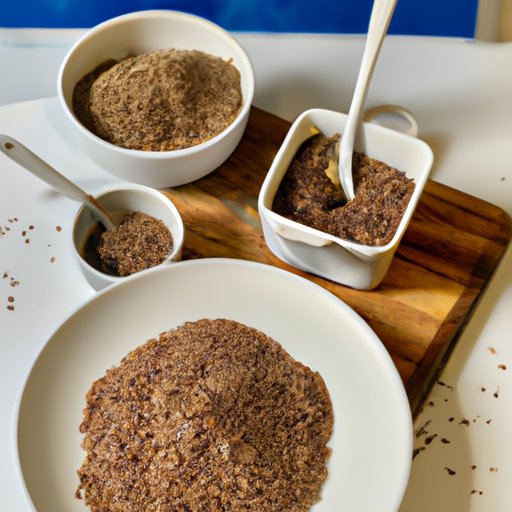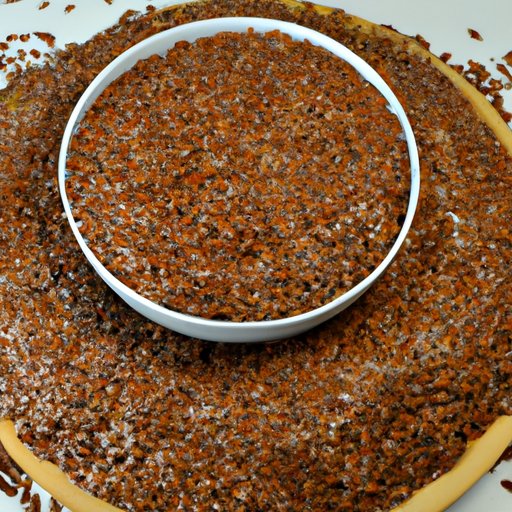Introduction
Flaxseed is a nutrient-dense seed that packs a big punch in terms of health benefits. It’s a great source of fiber, omega-3 fatty acids, and lignans, which are compounds with antioxidant and anti-inflammatory properties. Adding flaxseed to your diet may help improve your cholesterol levels, digestive health, and weight management as well as reduce inflammation.
Exploring the Health Benefits of Flaxseed
There are many reasons why flaxseed should be included in your diet. Here are five of the most important:
Five Reasons to Add Flaxseed to Your Diet
Nutritional Profile
Flaxseed is a great source of essential vitamins and minerals. It’s high in thiamin, magnesium, phosphorus, manganese, and selenium. It also contains omega-3 fatty acids, which are important for heart health and brain function. Additionally, it’s high in dietary fiber, both soluble and insoluble.
Lowering Cholesterol Levels
Adding flaxseed to your diet can help lower your cholesterol levels. A study published in the American Journal of Clinical Nutrition found that consuming 10 grams of ground flaxseed per day for 12 weeks significantly reduced total and LDL cholesterol levels in participants. LDL cholesterol is often referred to as “bad” cholesterol because it can contribute to the buildup of plaque in your arteries.
Improved Digestive Health
The high fiber content of flaxseed makes it a great choice for improving digestive health. The soluble fiber in flaxseed helps absorb water in the gut, which can help prevent constipation and promote regularity. Additionally, the insoluble fiber helps add bulk to stool, which can make it easier to pass.
Reduced Inflammation
The lignans in flaxseed have powerful anti-inflammatory properties. Studies have found that consuming flaxseed can reduce inflammatory markers in the body, such as C-reactive protein (CRP). High CRP levels are associated with an increased risk of chronic diseases, such as heart disease and diabetes.
Weight Management
Flaxseed is a great addition to any weight management plan. The high fiber content can help you feel fuller longer and reduce cravings. Additionally, the omega-3 fatty acids can help boost your metabolism and increase fat burning. Plus, the lignans may help regulate hormones associated with appetite and satiety.

How Flaxseed Can Help Lower Cholesterol Levels
The cholesterol-lowering properties of flaxseed can be attributed to its three main components: soluble fiber, omega-3 fatty acids, and lignans. Here’s a closer look at each one:
The Role of Soluble Fiber
Soluble fiber is the type of fiber found in flaxseed that dissolves in water. It binds to bile acids in the intestines, which are made from cholesterol. This helps reduce the amount of cholesterol absorbed into the bloodstream.
Omega-3 Fatty Acids
Flaxseed is a great source of omega-3 fatty acids, which are essential for heart health. They help reduce triglycerides and LDL cholesterol levels, which can help reduce your risk of heart disease. Additionally, omega-3 fatty acids can help reduce inflammation, which is another risk factor for heart disease.
Lignans
Lignans are compounds found in plants that have antioxidant and anti-inflammatory properties. Studies have found that they can help reduce cholesterol levels by inhibiting the absorption of cholesterol in the intestines.

The Nutritional Profile of Flaxseed
Flaxseed is a nutrient-dense food that provides many essential vitamins and minerals. Here’s a look at the macronutrients and micronutrients in flaxseed:
Macronutrients
One tablespoon of ground flaxseed contains 37 calories, 2.3 grams of protein, 3.7 grams of fat, and 1.9 grams of dietary fiber.
Vitamins and Minerals
Flaxseed is also a great source of essential vitamins and minerals. One tablespoon of ground flaxseed contains 15% of the recommended daily value (DV) of thiamin, 8% DV of magnesium, 7% DV of phosphorus, 6% DV of manganese, and 5% DV of selenium.
Is Flaxseed the Superfood It’s Made Out to Be?
Flaxseed is often referred to as a “superfood” due to its impressive nutrient profile. But there are some potential downsides to consider before adding it to your diet. Here are the pros and cons of including flaxseed in your diet:
Pros of Including Flaxseed in Your Diet
Flaxseed is a nutrient-dense food that offers many health benefits. It’s high in fiber, omega-3 fatty acids, and lignans, which can help improve cholesterol levels, digestive health, and weight management as well as reduce inflammation.
Cons of Including Flaxseed in Your Diet
Some people may experience digestive issues when consuming flaxseed due to its high fiber content. Additionally, the omega-3 fatty acids in flaxseed can interfere with blood-thinning medications. It’s important to speak with your doctor before adding flaxseed to your diet.
A Guide to Preparing and Cooking with Flaxseed
Flaxseed can be used in a variety of recipes. Here’s what you need to know about preparing and cooking with flaxseed:
Ground or Whole Flaxseed
Flaxseed is available in either ground or whole form. Ground flaxseed is better absorbed by the body and more easily added to recipes. But if you choose to buy whole flaxseed, you can grind it yourself using a coffee grinder. Just be sure to store it in an airtight container in the refrigerator or freezer to prevent it from going rancid.
Storing Flaxseed
It’s important to store flaxseed properly to keep it fresh. Store it in an airtight container in the refrigerator or freezer to prevent it from going rancid. It’s best to use it within one month of purchase.
Tips for Cooking with Flaxseed
When cooking with flaxseed, it’s important to keep a few things in mind. First, avoid heating it too much, as this can reduce its nutritional benefits. Second, don’t add it to hot liquids, as this can cause it to gel up. Third, add it to recipes after they have been cooked, as this will help preserve its nutritional benefits.

How to Incorporate Flaxseed into Your Everyday Meals
Flaxseed is a versatile ingredient that can be added to a variety of dishes. Here are some ideas for incorporating it into your everyday meals:
Adding Flaxseed to Breakfast
Add ground flaxseed to oatmeal, smoothies, yogurt, or cereal. You can also sprinkle it on top of toast, pancakes, or waffles. Or try adding it to muffins, breads, or other baked goods.
Adding Flaxseed to Lunch
Sprinkle ground flaxseed on salads, sandwiches, wraps, or soups. Or try adding it to guacamole, hummus, or other dips. You can also use it as a coating for chicken, fish, or tofu.
Adding Flaxseed to Dinner
Add ground flaxseed to casseroles, stir-fries, pasta dishes, or rice dishes. You can also add it to sauces, dressings, or marinades. Or try adding it to meatballs, burgers, or veggie burgers.
Conclusion
Flaxseed is a nutrient-dense food that provides many health benefits. It’s high in fiber, omega-3 fatty acids, and lignans, which can help improve cholesterol levels, digestive health, and weight management as well as reduce inflammation. Additionally, it’s a great source of essential vitamins and minerals. When incorporating flaxseed into your diet, it’s important to remember to store it properly and not to heat it too much. With these tips, you can easily add this superfood to your everyday meals.
(Note: Is this article not meeting your expectations? Do you have knowledge or insights to share? Unlock new opportunities and expand your reach by joining our authors team. Click Registration to join us and share your expertise with our readers.)
